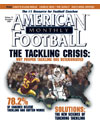AMERICAN FOOTBALL MONTHLY THE #1 RESOURCE FOR FOOTBALL COACHES
Article CategoriesAFM Magazine
|
AFM Subscribers Ask...with Charlie Weisby: Charlie Weis© More from this issue In Charlie Weis’ first two seasons as head coach, the Notre Dame roster was deep with leadership from strong junior and senior classes – giving Coach Weis a record combined-win total for the first two seasons for any University of Notre Dame head football coach. The following two seasons found Coach Weis developing a squad of young, inexperienced freshmen and sophomores, resulting in two tough seasons. Now with his fourth season well underway (at time of printing), it appears that Coach Weis’ tutelage of his student-athletes is paying dividends with a 5-2 record and an opportunity for a bowl berth. He answers your questions… Coach Weis, accountability in my eyes is one of the most important aspects in the game of football. How do you hold your players accountable for their performance on and off the field? Also how do you ....The full article can only be seen by subscribers. Subscribe today!
|
|
|||||||
| HOME |
MAGAZINE |
SUBSCRIBE | ONLINE COLUMNISTS | COACHING VIDEOS |
Copyright 2025, AmericanFootballMonthly.com
All Rights Reserved





